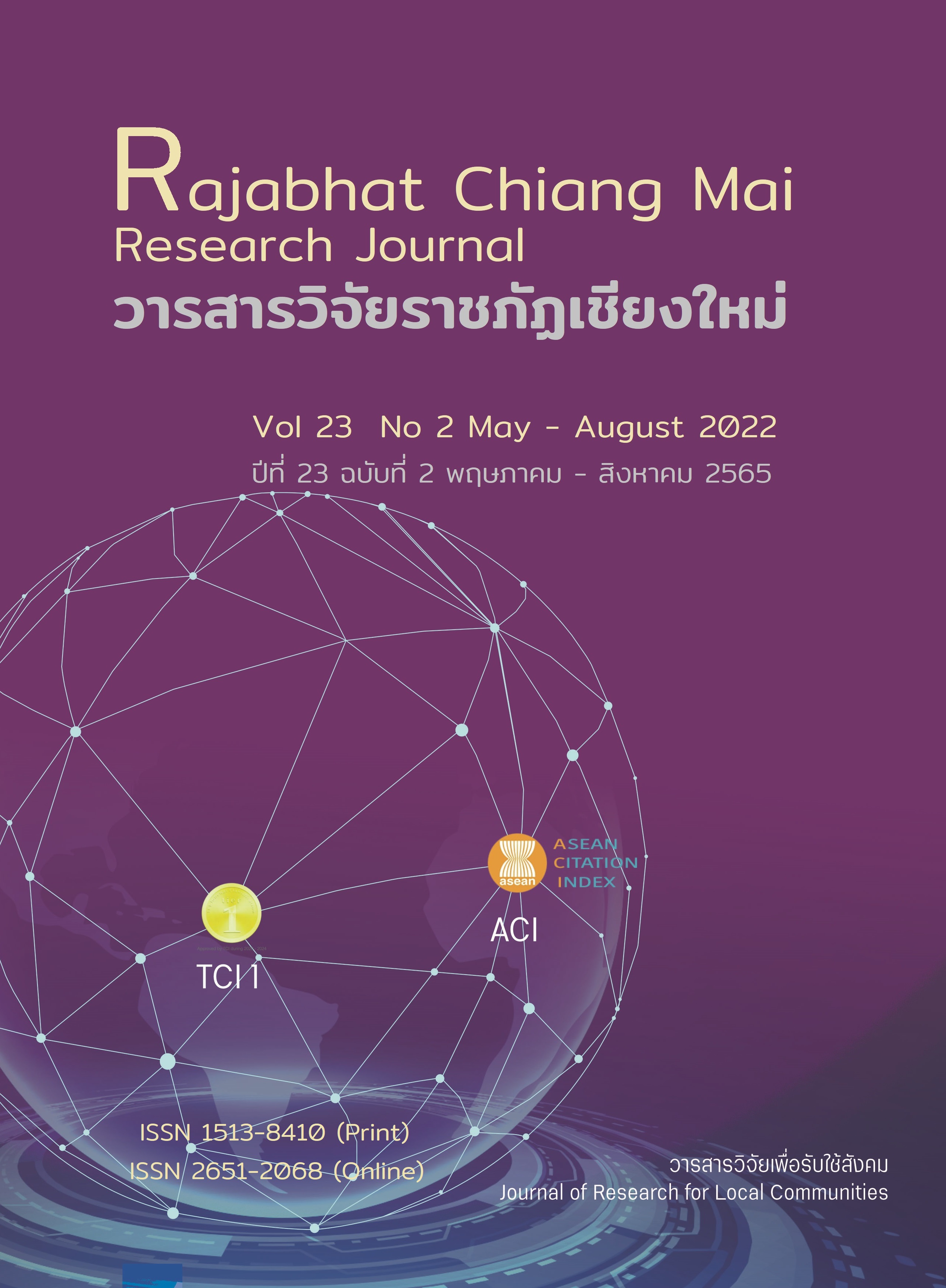Promotion Approach for The Elderly Health Tourism In Nakorn-nayok Province
DOI:
https://doi.org/10.14456/rcmrj.2022.249286Keywords:
Tourism promotion approach, Health tourism, The elderlyAbstract
The objectives of this study were: 1) to examine potential of stakeholders on management of health tourism, and 2) to investigate an approach to promote the elderly health tourism in Nakorn-Nayok Province. The mix methods of quantitative and qualitative research were conducted.. The samples were 24 samples, namely, community leaders, representatives of subdistrict administrative organization, and local entrepreneurs, who were selected by a purposive sampling. The instrument was an interviews using semi-structured questionnaires. analyze the SWOT and TOWS Matrix to establish proactive strategy to enhance the potential of health tourism. The statistics used in the study were frequency, percentage, mean and standard deviation. The results showed that the potential of health tourism promotion for the elderly, as a whole, was at a high level. From the in-depth interview, it was found that stakeholders needed development of health tourist attractions for the elderly in their own areas. They thought that in Nakorn-Nayok, its nature and attractions were distinctive and appropriate for health tourism and also had health personnel and experts. There was a concrete learning center with good health instructors for the elderly, which was a good point in the community. The weak points were that the health tourism management was not good enough and lack of knowledge transfer because new generation took on other jobs resulting in no continuous knowledge management and new technology changed the way of life in community. Therefore, the community leaders proposed an approach to promote the elderly health tourism as follows: an appropriate community management with strong leaders and a serious cooperation from people in community. An appropriate, well-planned tourism activities should meet the needs of the elderly and a health tourism for the elderly should be promoted continuously.
Downloads
References
Bunnag, O. & Charoenboon, R. (2015). The Potential Development Guideline of Tourism in Kanchanaburi Province to Support the ASEAN Community. Rajabhat Chiang Mai Research Journal, 16(1), pp.1-15. Retrieved from https://so05.tci-thaijo.org/index.php/ cmruresearch/article/view/95174/74361 (in Thai)
Chanchaochai, D. (2013). Thailand and Health Tourism. Seminar Marketing, 2013 (159). (in Thai)
Cheytim, A. (2017). Happiness of the Elderly in the Senior Citizens Club in Bangkok. (Master’s thesis, Silpakorn University). (in Thai)
Chusri, W. & Lalitsasivimol, W. (2020). Health Tourisms: Thailand’s Competitiveness. Princess of Naradhiwas University Journal of Humanities and Social Sciences, 7(2), pp.205-226. Retrieved from https://so05.tci-thaijo.org/index.php/pnuhuso/article/view/227727/ 166493 (in Thai)
Kammanid, S. (2018). The Community Based Health Tourism Management: Case Study Mueng District, Mae Hong Son Province. Chiang Mai: Chiang Mai Rajabhat University. (in Thai)
Kieanwatana, K. (2018). Situations and Trends of World and Thailand Health Tourism. Journal of Cultural Approach, 19(35), pp.77-87. Retrieved from https://so02.tci-thaijo.org/index.php/cultural_approach/article/view/123953/94030 (in Thai)
Kupkitaphun, K. & Bunjongmanee, P. (2020). The Guidelines of Health Tourism Development of European Tourist in Prachuap khiri khan Province. Journal of Graduate Studies Valaya Alongkorn Rajabhat University, 14(1), pp.1-13. Retrieved from https://so02.tci-thaijo.org/index.php/JournalGradVRU/article/view/211712/163883 (in Thai)
Nakhon Nayok Provincial Office. (2019). Nakhon Nayok Province Development Plan, 2018 - 2021 (2019 review). Nakhon Nayok: Office. (in Thai)
Panya, R. (2012). Development the Potential of Medical Tourism Management of Chiang Mai Local Community Phase 3. Retrieved from file:///C:/Users/Library/Downloads/562-58-MGT-NRCT.pdf (in Thai)
Prasitbureerak, P. (2015). A Study of Breakeven Point for Sustainable Community-Based Tourism, Baan Sanlomjoy Community, Tambon Suthep, Amphur Muang, Chiang Mai. FEU Academic Review Journal, 9(1), pp.81-92. Retrieved from https://so01.tci-thaijo.org/ index.php/FEU/article/view/29468/32283 (in Thai)
Pratep, T. (2021). 21st century and elderly tourism in Thailand. Retrieved from https://bsru.net/ศตวรรษที่21กับการท่องเที่/ (in Thai)
Report on the situation of the Thai elderly in 2020. (2020). Retrieved from
https://thaitgri.org/?p=39784 (in Thai)
SleepHappy. (2022). 3 Factor of Health and wellness travel trends for 2022. Retrieved from https://healthserv.net/3ปัจจัยสู่เทรนด์-WellnessTourism-การท่องเที่ยวเชิงสุขภาพ-ปี2565-13541
Soonthonsmai, V. and Thammachart, P. (2016). Community-Based Healthy Tourism Patterns for Sustainable Development of Community-Based Enterprise Networking in Prajinburi Province. Journal of the Association of Researchers, 21(3), pp.167-181. Retrieved from https://so04.tci-thaijo.org/index.php/jar/article/view/244223/166158 (in Thai)
Tabsirak, A. (2012). Potential Development of Cultural Tourism Management for the Nyahkur Ethnic Group Thepsathit District, Chaiyaphum Province. (Master’s thesis, Khon Kaen University). (in Thai)
Teeranon, K. (2018). Thailand’s Wellness Tourism: Situation and Potential towards Competition of ASEAN Region, FEU Academic Review Journal, 12 (Supplement), 22-34. (in Thai)
Toonpirom, V. (2019). Wellness Tourism : New Tourism Strategy. Retrieved from http://gotomanager.com/content/wellness-tourism-ยุทธศาสตร์ใหม่การท่องเที่ยว (in Thai)
Tourism Authority of Thailand. (2018). Tourism Strategic. Bangkok: Tourism Authority of Thailand. (in Thai)
Visadsoontornsaku, P., na Thalang, C., Tungbenchasirikul, S. & Jittithavorn, C. (2020). Potentiality Development Approach for Community-based Tourism in Nakhon Ratchasima Province. The Journal of Development Research, 10(3), pp.22-33. Retrieved from https://so01.tci-thaijo.org/index.php/JDAR/article/view/244095/165447 (in Thai)
Yonwikai, W. (2019). Business Development Guidelines to Support Tourism Behaviors of Elders Travelling in Thailand. Dusit Thani College Journal, 13(2), 428-438. Retrieved from https://so01.tci-thaijo.org/index.php/journaldtc/issue/view/16528/3836 (in Thai)
Downloads
Published
How to Cite
Issue
Section
License
Copyright (c) 2022 Rajabhat Chiang Mai Research Journal

This work is licensed under a Creative Commons Attribution-NonCommercial-NoDerivatives 4.0 International License.
1. Articles, information, content, images, etc published in the “Community and Social Development Journal” are copyrighted by the Community and Social Development Journal, Chiang Mai Rajabhat University. In order to properly distribute the articles through print and electronic media, the authors still hold the copyright for the published articles under the Creative Commons Attribution (CC BY) license, which allows the re-distribution of the articles in other sources. References must be made to the articles in the journal. The authors are responsible for requesting permission to reproduce copyrighted content from other sources.
2. The content of the articles appearing in the journal is the direct responsibility of the article authors. The editorial board of the journal does not necessarily agree with or share any responsibility.














